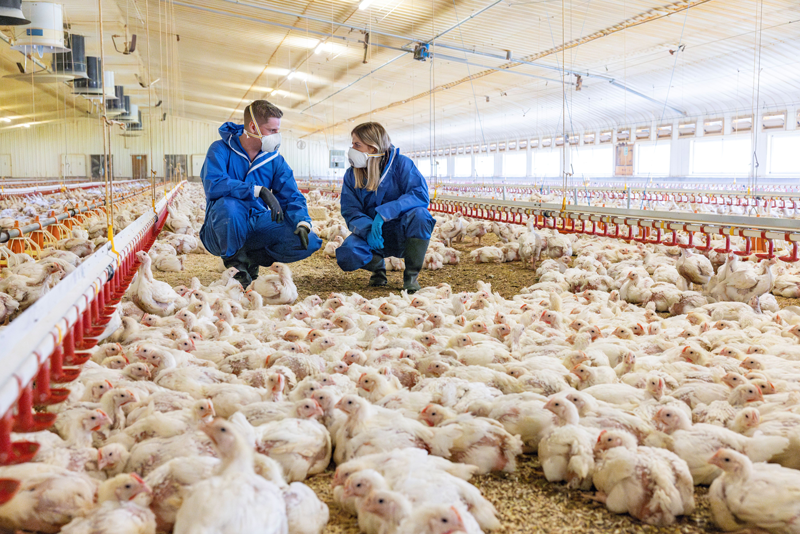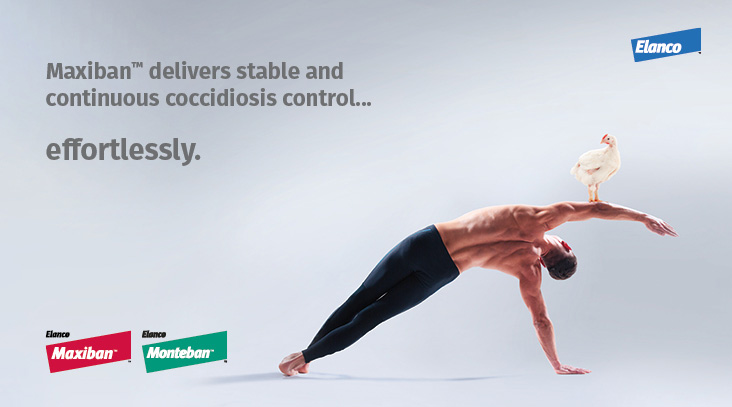As some of the broiler industry adopt lower stocking densities, the risk of disease, particularly coccidiosis, may be underestimated. Continuous proven coccidiosis control is crucial to maintaining gut stability and maximising productivity at a time when profit margins are being squeezed.
Elanco technical consultant, Joshua Davison, says the move from 38 kg/m2 stocking density to 30 kg/m2 is unlikely to reduce disease pressure and warns that simply reducing bird numbers in the shed does not eliminate the risk of coccidiosis.

“While the reduction in stocking density might give the impression of lower disease risk, the reality is that the disease burden still remains high,” he adds.
“And with fewer birds, it can take longer to spot early environmental changes, making consistent monitoring and proven disease control measures crucial.”
Mr Davison says reduced stocking density presents big management changes on-farm, including correctly controlling the birds’ environment, which is why maintaining optimal bird and farm management is vital for performance.
Correct control of the housed environment
With changes to stocking density presenting such a big management change on-farm, producers should be cautious of making other tweaks simultaneously.
“For example, with a reduced stocking density, it’s important to ensure the correct ventilation and heating requirements are in place,” explains Mr Davison.
“Determining this may now need to be based on bird activity, rather than assessing the litter, which has previously been a good indication of ventilation requirements.”
He highlights that if sheds house large numbers of birds and are under-ventilated, there is a higher risk of humidity,which could result in greater than expected coccidia and bacterial burdens.
“Appropriately ventilated sheds can also help to reduce the prevalence of footpad dermatitis and hock burn – two health problems associated with poor litter quality.”
Mr Davison explains the upcoming months, particularly with the arrival of winter and changing weather conditions, will be a critical period for farms to address and resolve the teething problems associated with the changes in stocking density.
“These changes are significant enough on their own, so it’s advisable to maintain stable and continuous disease management programmes, including coccidiosis control, during this transition and beyond,” he says.

The necessity of a stable and continuous coccidiosis control programme
With fewer birds in the shed, Mr Davison says making every bird count may sound like a cliché, but it is undeniably important for maintaining overall productivity and profitability.
“Up to now, producers have done exceptional work to keep coccidiosis and other diseases at bay; it’s important to keep up the good work,” he adds.
“Stable and continuous coccidiosis programmes are essential for maintaining Intestinal Integrity, which in turn is associated with better bird performance and increased profitability,” says Mr Davison.
He advises that a consistent proven approach to coccidiosis control, using Maxiban™ in combination with Monteban™ can provide a stable coccidial population control throughout the bird’s life.
“Doing your utmost to prevent coccidiosis from becoming a problem will always be a better option than tackling the disease once symptoms arise and the flock is already impacted,” says Mr Davison.
For example, birds challenged with coccidiosis are more likely to develop secondary issues such as necrotic enteritis[1].
But on the contrary, those that are healthy, with improved Intestinal Integrity, are proven to have better growth rates[2]and deliver more A-grade carcasses.
Mode of action
Maxiban is a potentiated ionophore that contains both narasin and nicarbazin to work effectively on coccidiosis control, while Monteban consists of narasin alone for effective control past the peak challenge, while the bird continues to develop immunity to the disease.
“The synergistic relationship between the two active ingredients in Maxiban effectively manage coccidiosis and allows birds to develop some natural immunity to the disease, which is crucial for long-term disease control and maintaining flock health,” he explains.
Enhancing bird performance
“Narasin supports consistent feed consumption and healthy growth rates: two components which are essential for achieving optimal production performance,” he says.
“The use of Maxiban has been shown to improve FCR by 5.46[3] and increase growth rates by 7.5%[4].”
Maxiban has also been proven to be effective across multiple production cycles each year, allowing more flocks to reach their full potential.
Mr Davison says its consistent use ensures optimal bird health and performance, providing greater value to producers by minimising disease impact and maximising productivity.
“By incorporating Maxiban in combination with Monteban into your coccidiosis control programme, you can achieve reliable results and sustain high levels of production year-round,” he adds.
For more information on effective coccidiosis control click the button below:
[1]Lanckriet A et al Avian Path 2010 63 (v1.0)
[2] Elanco Final Report Study ELA1900304 2019 (v2.0)
[3] Elanco Study Maxiban ROI Calculations 2023 (v2.0)
[4] Metzler,MJ et al Poult Sci 1987 1451 (v1.0)


